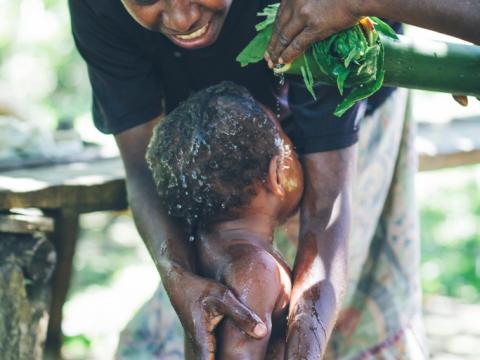Clean water: A better future for children and easier bath time for mums

Grant project name: Vanuatu Community Health Project
Funded by: The Australian Department of Foreign Affairs and Trade
Time frame: 1 October 2011 – 30 June 2017
Purpose and objectives: World Vision’s Vanuatu Community Health Project will benefit 4,187 people in 47 communities in Penama and Sanma by 2017. The project focuses on increasing access to clean water and improving sanitation, hygiene and nutrition behaviours aimed at reducing child malnutrition.
In many of the project’s communities, there is little knowledge of sanitation and hygiene practices, coupled with unprotected and poor water supply facilities.
Most communities do not have adequate sanitation facilities such as latrines, which leads to defecation in open areas. Consequently, waterborne diseases like diarrhoea and skin and eye infections are prevalent.
The project integrates water sanitation and hygiene (WASH) with World Vision’s 7-11 approach to address maternal and child health issues. This ensures a holistic approach and communities have improved access to water and sanitation facilities, while also having greater awareness of health issues such as nutrition and exclusive breastfeeding.
MEET SOME families BENEFITTING FROM THIS PROJECT:
Meet the Tabi family from the village of Lebiwibwi in the centre of Vanuatu’s Penetecost Island.
Cousins Tenlisou, Katrina and Wude, aged two, three and four respectively, are cheeky, healthy children who are shy in front of a camera and definitely don’t like bath time.
But despite their protests, bathing them in Lebiwibwi is much easier for their mums, Lai Saimon, Auika and Ledina. With clean water in their village, the mothers no longer have to trek for hours to collect water, meaning they have more time with their families and avoid the dangerous walk through thick scrub.
Before World Vision’s Vanuatu Community Health Project started in central Pentecost, in the north of the Pacific Island nation, many communities didn’t have access to clean water and practised poor hygiene, while a lack of household toilets meant defecation in open areas was common.
Parents and other caregivers often didn’t know basic hygiene, including the importance of hand washing before preparing and eating meals, so children frequently suffered illnesses such as diarrhoea and skin and eye infections.
World Vision’s health project works with villages in central Pentecost to improve awareness of the importance of clean water and improved sanitation and hygiene practices. With support from the Australian government, the project builds knowledge through the Participatory Hygiene and Sanitation Training (PHAST) model, a behavioural change approach to reduce the spread of disease.
Lebiwibwi is cleaner and healthier than before, with access to clean water from a shared tank and improved toilet and hand-washing facilities.
For Ledina Tabi, the project has transformed not just her family’s health, but also her community.
Lebiwibwi is cleaner and healthier than before, with access to clean water from a shared tank and improved toilet and hand-washing facilities. Parents and other caregivers have also learned the importance of nutrition and exclusively breastfeeding infants.
“Before, adults and children were sick about twice a month,” Ledina says. “We didn’t have clean water in our village and used to walk for hours [for water] or get it from tree trunks to drink.”
“Now there is less diarrhoea in the community because we get water from clean water tanks rather than tree trunks,” she continues, “and also as we’re practising good sanitation, like hand washing after going to the toilet and before cooking.”
Last year, the project improved access to hygiene education, latrines and hand-washing facilities for nearly one thousand people, thereby reducing waterborne disease. Meanwhile, World Vision also built 15 water catchment tanks to give 319 people clean water access.
Ledina says: “The project helps us understand that prevention can be done at home, like mopping up water to prevent [the spread of] malaria and hand washing to prevent diarrhoea.”
The project uses a community-led approach, meaning local people drive change. The formation of committees, including male and female representation, and training for their members in basic plumbing and facility construction means community health will improve long after the project finishes.
“If we continue the project”, the mother concludes, “then we’ll have a good future for our children.”